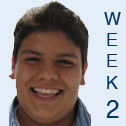First Language Acquisition
There’s a lot missing from the speech of a typical two-year-old. This in itself is of no great interest--after all, there are lots of other things that two-year-olds aren't that good at. What makes the two-year-old more interesting to the linguist is that there are striking regularities in what gets missed out where... (Colin Phillips 1995, MIT)
One of the first things that should strike any half observant parent is the speed and apparent accuracy in which a child proceeds to learn his or her own language. Even the most clever of scientists today do not know where to begin with trying to unravel the range of complexities that language brings. Nevertheless, the child moves always onward and proceeds with little effort to crack the sacred code. How could this be? Firstly, parents provide very little in the way of language instruction to the child. Contrary to what might be believed, parents do not teach their children to speak, but the time a child enters pre-school, he has more-or-less mastered much of his target language.
Linguists Noam Chomsky has stated the hypothesis that children have innate language-specific abilities that facilitate and constrain language learning. Chomsky originally theorized that children were born with a hard-wired language acquisition device (LAD) in their brains. He later expanded this idea into that of Universal Grammar, a set of innate principles and adjustable parameters that are common to all human languages. According to Chomsky, the presence of Universal Grammar in the brains of children allows them to deduce the structure of their native languages from "mere exposure".
Much of the evidence supporting Chomsky’s Nativist position is based on the early age at which children show competency in their native grammars, as well as the ways in which they do (and do not) make errors. Infants are born able to distinguish between phonemes in minimal pairs, distinguishing between bah and pah, for example. Young children (under the age of three) do not speak in fully formed sentences, instead saying things like 'want cookie' or 'my coat.' They do not, however, say things like 'want my' or 'I cookie,' statements that would break the syntactic structure of the Phrase, a component of universal grammar. Children also seem remarkably immune from error correction by adults, which Nativists say would not be the case if children were learning from their parents.
The possible existence of a Critical Period for language acquisition is another Nativist argument. Critical periods are time frames during which environmental exposure is needed to stimulate an innate trait. Young chaffinches, for example, must hear the song of an adult chaffinch before reaching maturity, or else would never be able to sing. Nativists argue that if a Critical Period for language acquisition exists, then language acquisition must be spurred on by the unfolding of the genome during maturation.








